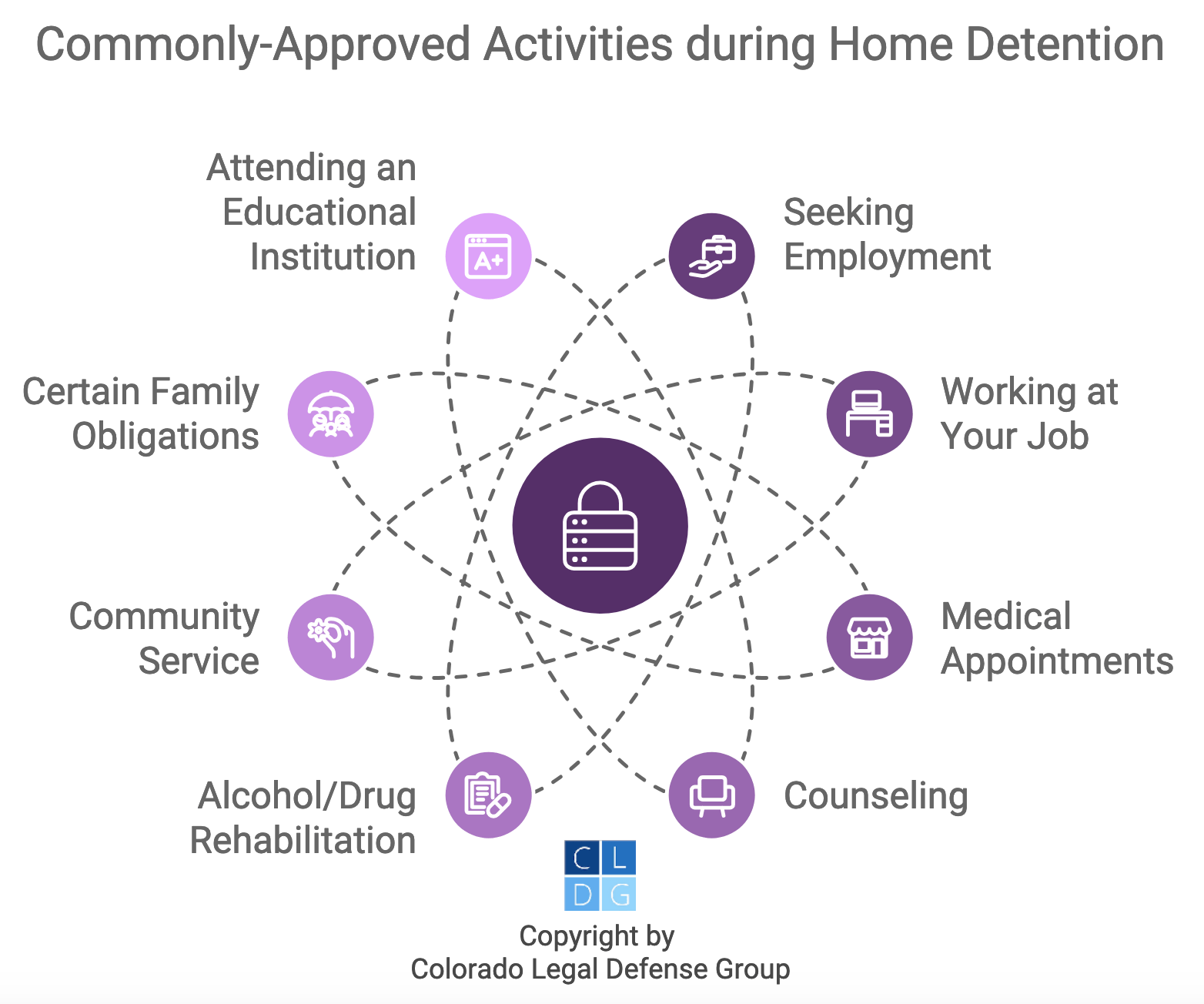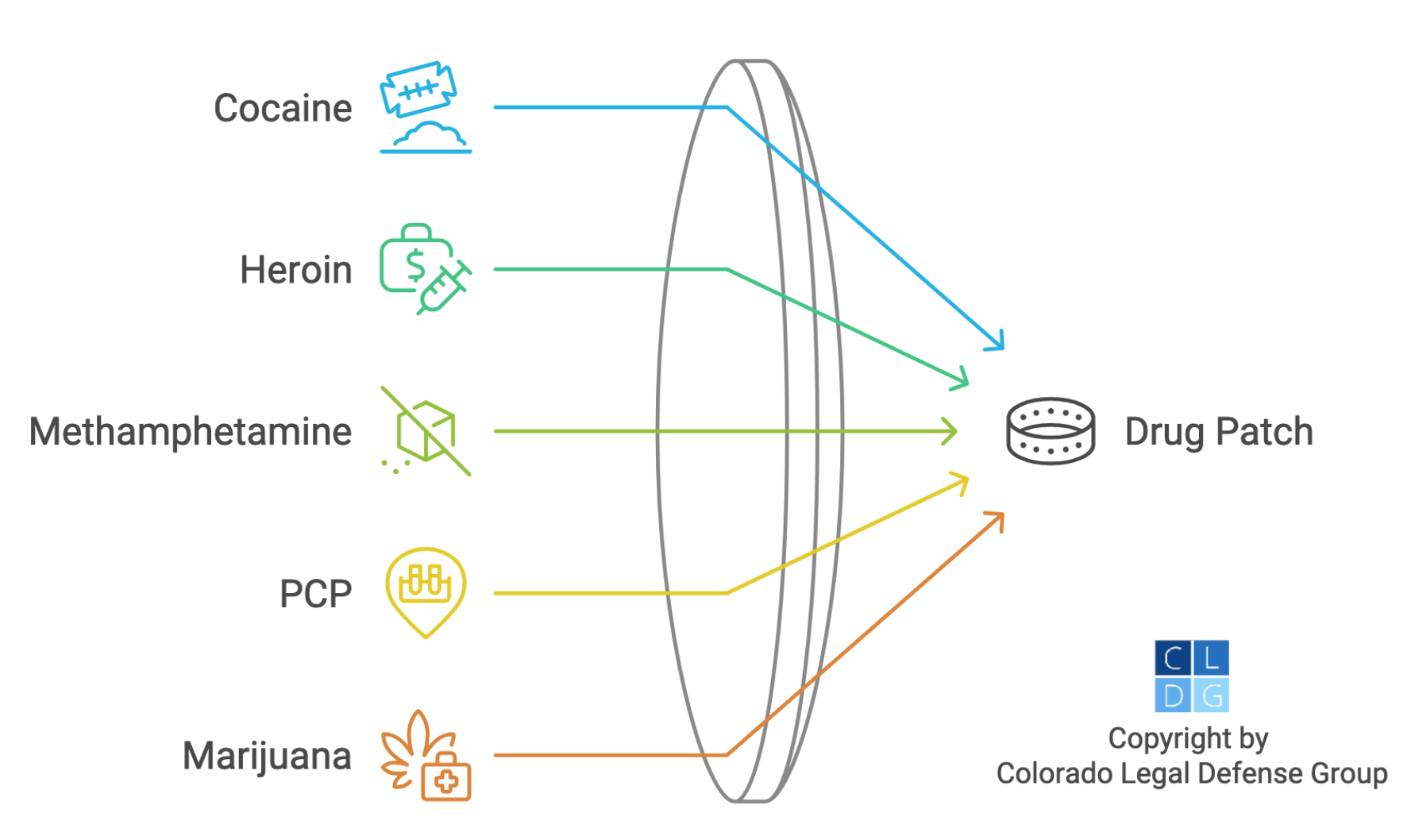In Colorado, house arrest is an alternative sentencing option to a jail sentence or prison term. In many cases, you have to wear an electronic monitoring ankle bracelet as a condition.
The primary benefit of house arrest (also called “home detention”) is that you can serve your sentence within your home or approved residence while also maintaining your employment and reintegrating into the community.
The following graphic shows some of the activities courts commonly approve for defendants serving house arrest.

In this article, our Colorado criminal defense lawyers will address:
- 1. How do I get home detention?
- 2. How does electronic monitoring work?
- 3. What happens if I violate the rules?
- Additional Reading
1. How do I get home detention?
Not everyone convicted of a Colorado crime is eligible for home detention, even if with a clean criminal history. Unless you are sentenced directly to a day reporting program, you will be confined as sentenced.1
You may petition the court during the sentencing hearing or later, for approval to participate in a home detention program. The court can also withdraw the home detention privilege at any time, with or without notice.2
Colorado house arrest may be available if you are convicted of
- a misdemeanor,
- a felony,
- nonpayment of any fine, or
- contempt of court
if the court deems such a sentence appropriate for you.3
If you are convicted of a sex crime, crimes related to domestic violence, or crimes involving the use of a deadly weapon, you are generally not eligible for home detention programs.4

House arrest is a jail alternative where you can serve your sentence at home.
2. How does electronic monitoring work?
House arrest in Colorado is monitored by electronic devices that detect and report your absence or presence within the approved residence. If electronic monitors detect that you are not in the residence as required by the terms of your release, the violation will be reported.
Violations of the terms of house arrest may result in
- revoking home detention,
- additional penalties, or
- imprisonment.
Aside from electronic devices, the terms of probation or home detention may permit a law enforcement officer, parole officer or probation officer to show up at any time and conduct a search or drug test (usually urinalysis).
How much does home monitoring cost?
The costs of home monitoring depend on whether you are gainfully employed, your other costs, and the type of monitoring involved.
If you are gainfully employed, your wages get distributed according to the sheriff to pay for:
- child support,
- spousal maintenance,
- victim compensation, and
- administrative services.
Types of Electronic Monitoring
There are different types of electronic monitoring systems, and each county has its own procedures.
Basic electronic monitoring involves you wearing an ankle transmitter and plugging a monitoring unit into a power outlet in your home. (You also need either a landline or cellular service for the unit to work.) Your anklet then transmits a 24-hour radio frequency (RF) signal to the monitoring agency, which checks for “irregularities” such as:
- tampering with the anklet or monitoring unit,
- staying out past curfew, and
- going to locations that are prohibited under your house arrest agreement.
The majority of Colorado counties use ankles with advanced GPS (global positioning system) technology. It relies on commercial cellular networks to map, track, and send data about your whereabouts 24/7 to the monitoring agency. Therefore the agency always knows when you are in an “inclusion zone” or have ventured into an “exclusion zones.”
Alcohol and Drug Monitoring
If you are on house arrest for DUI or other alcohol-related crime – or if you are an alcoholic – the judge may order that you wear a Secure Continuous Remote Alcohol Monitor (SCRAM) anklet as well. This device uses transdermal testing to check whether you have ingested any alcohol.
Similarly, if you are on house arrest for a drug-related crime or are an addict, the judge may order that you wear a drug patch that picks up traces of narcotics you may have ingested. The following graphic shows some of these controlled substances.

Drug patches get checked and replaced once a week.
3. What happens if I violate the rules?
Violating the terms of home detention may result in your house arrest in Colorado getting revoked. Common violations include:
- not being at home during required hours
- not showing up to work, school, or face-to-face meetings with your probation officer,
- failing a drug test,
- breaking curfew,
- alcohol detection on the continuous alcohol monitoring device, or
- failure to pay restitution or fines.
If the monitoring devices detect you are not at home during required hours, your probation or parole officer will be notified, and a warrant may be issued for your arrest.
You are then entitled to a hearing where you can argue to the judge that you did not violate your terms and should be allowed to remain on house arrest. If the court finds that you did violate probation, the court may:
- reprimand you,
- harshen and extend your probationary period, or
- remand you to prison.

Many people placed on house arrest are placed on electronic monitoring.
Additional Reading
For more in-depth information, refer to these scholarly articles:
- Home as Prison: The Use of House Arrest – Federal Probation.
- Between the ‘Home’ and ‘Institutional’ Worlds: Tensions and Contradictions in the Practice of House Arrest – Critical Criminology.
- House Arrest: A Critical Analysis of an Intermediate-Level Penal Sanction – University of Pennsylvania Law Review.
- A Brief History of House Arrest and Electronic Monitoring – Northern Kentucky Law Review.
- Exploring the Option of House Arrest – Federal Probation.
Legal References
- C.R.S. 18-1.3-106. See, for example, In Re. Gunkel (Colo. 2021) 500 P.3d 381; Caswell v. People (Colo. 2023) 536 P.3d 323.
- C.R.S. 18-1.3-106(1)(b)(2).
- C.R.S. 18-1.3-106(1)(b).
- C.R.S. 18-1.3-106(11).
